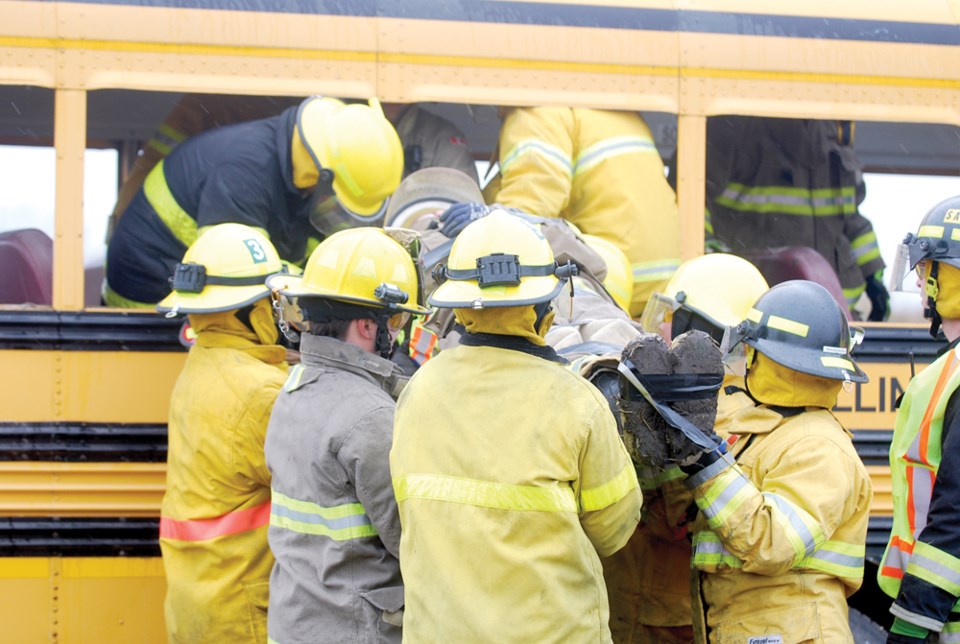Firefighters all across the province gathered in Humboldt for the Saskatchewan Volunteer Fire Fighter Association’s (SVFFA) Fire School from Oct. 2-4.
Small fire departments all across the province have limited budgets when it comes to training, says LeRoy fire chief Paul Cockell.
Schools like this are held twice a year and get firefighters, old and new, out and sharing ideas.
Cockell says even with his experience, he learns something new every school, both as a student and a fire chief.
“Somebody that comes from small town departments, much like myself, I might not have any clue about what a Humboldt or Estevan or anyone of the bigger centres would do. It’s a real eye opener to get some different ideas,” he says.
SVFFA President Doug Lapchuk says that the school takes on both in-class and hands-on learning because a lot of these fire fighters have not been in school for while.
“Take the aspect of hands-on training and doing the practical, they learn far better by doing than seeing and being told,” he said.
The school replicates all different aspects of firefighting, from deal ing with actual fires to vehicle extrication to ladders and knots.
“Everything that a fire fighter would have to do in the field we try to replicate,” he said.
In all, 197 students participated from at least 50 communities, said Lapchuk. The event in Humboldt saw a few northern communities but Lapchuk said that when the schools are in more northern communities, it is easier for them to travel the distance than southern communities.
The mental side of fire fighting was also a big part of the fire school.
During the bus extrication drills, “victims” were very vocal and were up and moving around.
Cockell says it adds that realism to the scene.
“If (a person is) injured, we don’t want them bouncing around, we don’t want them moving. Lo and behold, maybe we don’t want them to see their loved one because of something unfortunate. That’s all things we have to have in play. These guys have to get used to that because it’s not quiet on scene, it’s loud,” he said.
Circumstances can also change quickly on the scene. A person can go from consciousness to shock very quickly.
Cockell said he had to see the sense of urgency.
“You need to get them out fast and I need to see them be able to recognize that...because they’ve gone from, we might be able to handle that to now it’s something that’s gone way beyond our capabilities and it’s a life or death situation. They only have minutes at that point,” he said.
Dealing with the mental aftermath of a scene is another part of firefighting. Critical Incident and Stress Debriefing and Critical Incident and Stress Management courses were brought in to discuss keeping firefighters safe after they go home from an incident.
“Our lot as volunteer firefighters in a lot of cases, we don’t have coverage for mental health,” said Lapchuk. “We don’t have the ability unless we can pay out of pocket for full counseling.”
Stress management means that firefighters are receiving that training to pass on to other communities. SVFFA is dedicated to helping both member and non-member firefighters alike.
“SVFFA has taken it upon themselves to make a $5,000 pool that’s accessible to any firefighter in the province, whether they are a member of our fire association or not. We want to make sure our people are safe. PTSD is real, it is out there,” he said.
Patty Stewart McCord was in Humboldt to teach the stress management courses and says that firefighters are twice as likely to have a stress reaction than police and EMTs.
“Over the past 10-15 years, there’s been a recognition that there are some long-term effects to volunteering and you see things that other people don’t see, you experience things that more people will never experience in their lives by being a firefighter in these situations,” she said.
Stewart McCord said that it’s important to know that not every tramatic event is going to elicit a reaction. They are normal to have and normal not to have.
“We want to make sure that people realize there are very resilient people out there fighting these fires,” she said. “We also acknowledge that once in a while, there is an event that may have an impact on them.”




